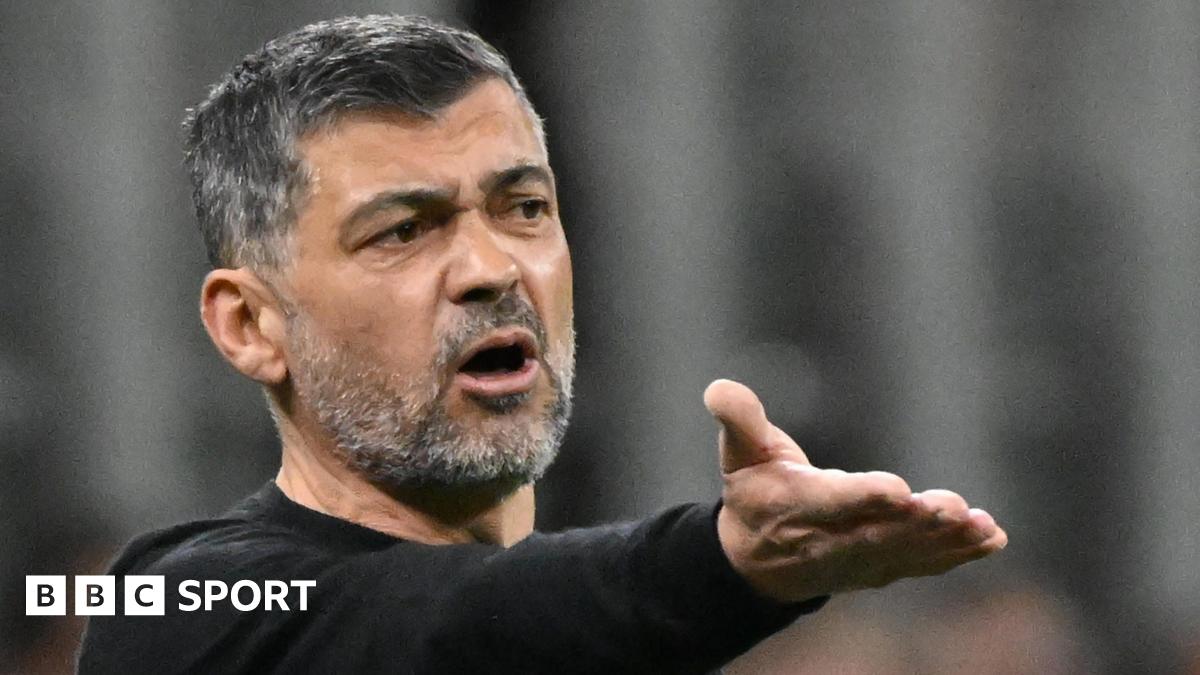Sergio Conceicao won the league title in Portugal three times with previous club Porto AC Milan have sacked coach Sergio Conceicao after just six months in charge of the Serie A club. Former manager Massimiliano Allegri - who spent four years in charge at San Siro between 2010 and 2014 - isreportedly set,externalfor a return. Conceicao, 50, was handed the joblast Decemberafter the the sacking of Paulo Fonseca and signed an 18-month deal. He won won 11 trophies in six years at Porto and won theItalian Super Cupwith Milan just a week after taking the job. But they lost theCoppa Italia finalto Bologna and their league form never really picked up. Under Conceicao, they finished in eighth place - meaning no European football next season - while rivals Inter play Paris St-Germain in this weekend's Champions League final. Milan said:,external"The club would like to thank Sergio and his staff for their commitment, professionalism and dedication in leading the team in recent months. "The Rossoneri family bids farewell to the coach who contributed to the conquest of the 50th trophy in Milan's history, wishing him the best for his future."
AC Milan sack coach Conceicao after six months in charge
TruthLens AI Suggested Headline:
"AC Milan parts ways with coach Sergio Conceicao after six months"
TruthLens AI Summary
AC Milan has terminated the contract of coach Sergio Conceicao after only six months in charge, marking a significant shift for the Serie A club. Conceicao, who previously enjoyed a successful tenure at Porto where he won three league titles and 11 trophies in total, was appointed in December following the dismissal of Paulo Fonseca. His time at Milan began on a promising note, as he secured the Italian Super Cup just a week into his role. However, the team's performance in the league did not meet expectations, finishing in eighth place and thereby missing out on European competition for the next season. The defeat in the Coppa Italia final to Bologna further compounded the challenges faced during his tenure, leading to the decision to part ways with the coach after a disappointing campaign.
The club's official statement expressed gratitude towards Conceicao and his staff for their hard work and dedication, particularly noting his contribution to the club's 50th trophy. Following his departure, there are reports that former manager Massimiliano Allegri, who previously led the team from 2010 to 2014, is poised for a return to the San Siro. This move reflects Milan's urgency to revitalize their squad and improve their standing in both domestic and European competitions. With rivals Inter Milan preparing for the Champions League final against Paris Saint-Germain, the pressure is on AC Milan to regroup and find a new direction that can restore their competitive edge in Italian football.
TruthLens AI Analysis
The recent decision by AC Milan to part ways with coach Sergio Conceicao after a mere six months highlights the volatile nature of football management. Conceicao's short tenure, which included a mixed bag of results, reflects the high expectations and pressures often faced by managers in top clubs.
Coaching Changes and Expectations
Sergio Conceicao, previously successful with Porto, joined AC Milan amid hopes of reviving the team's fortunes. Despite winning the Italian Super Cup shortly after his appointment, his overall results were disappointing, culminating in an eighth-place finish in Serie A. This lack of success, particularly the failure to secure European football, likely contributed to the club's decision to seek a change. The announcement of Allegri's potential return underscores the desire for stability and a proven track record at the club.
Communication and Club Image
In their statement, AC Milan expressed gratitude towards Conceicao, which is a standard practice in football to maintain a positive public image. This kind of communication aims to soften the blow of a high-profile dismissal and to preserve the manager's reputation for future opportunities. It also serves to reassure fans that the club values commitment and professionalism, even amidst disappointing results.
Underlying Issues and Public Perception
The news may also serve to distract from deeper issues within the club, such as financial stability or internal conflicts. By focusing on the coach's dismissal, the club diverts attention from potential criticisms regarding player performance or management decisions. This strategic communication can help manage public perception and maintain fan engagement.
Impact on Stakeholders
The decision could have various implications for fans, players, and investors. Fans might feel a mix of disappointment and hope, depending on the new manager's reputation and the club's direction. Players may experience uncertainty but could also be motivated to prove themselves under a new regime. For investors, the coaching change can signal a desire for improved performance, which may influence the club's market valuation and stock performance if applicable.
Community Support and Target Audience
The news resonates more with dedicated football fans and AC Milan supporters who closely follow managerial changes. It caters to a community that values success and performance, reflecting the ongoing narrative of high stakes in football management.
Potential Market Impact
The announcement may have ripple effects in the stock market, particularly if AC Milan is publicly traded or if related sponsorship deals are involved. Potential investors might reassess their positions based on the club's direction and leadership.
Global Football Context
This coaching change doesn't drastically alter the global football power dynamics but does contribute to the ongoing narrative of managerial instability in top European clubs. It mirrors broader trends where clubs are increasingly quick to act in response to underperformance.
The article appears credible, as it discusses a commonly reported event in sports news and provides a context that aligns with the known pressures in football management. However, the potential for manipulation exists in the framing of the narrative, particularly in how the club’s communications may aim to control public sentiment and distract from underlying challenges.
